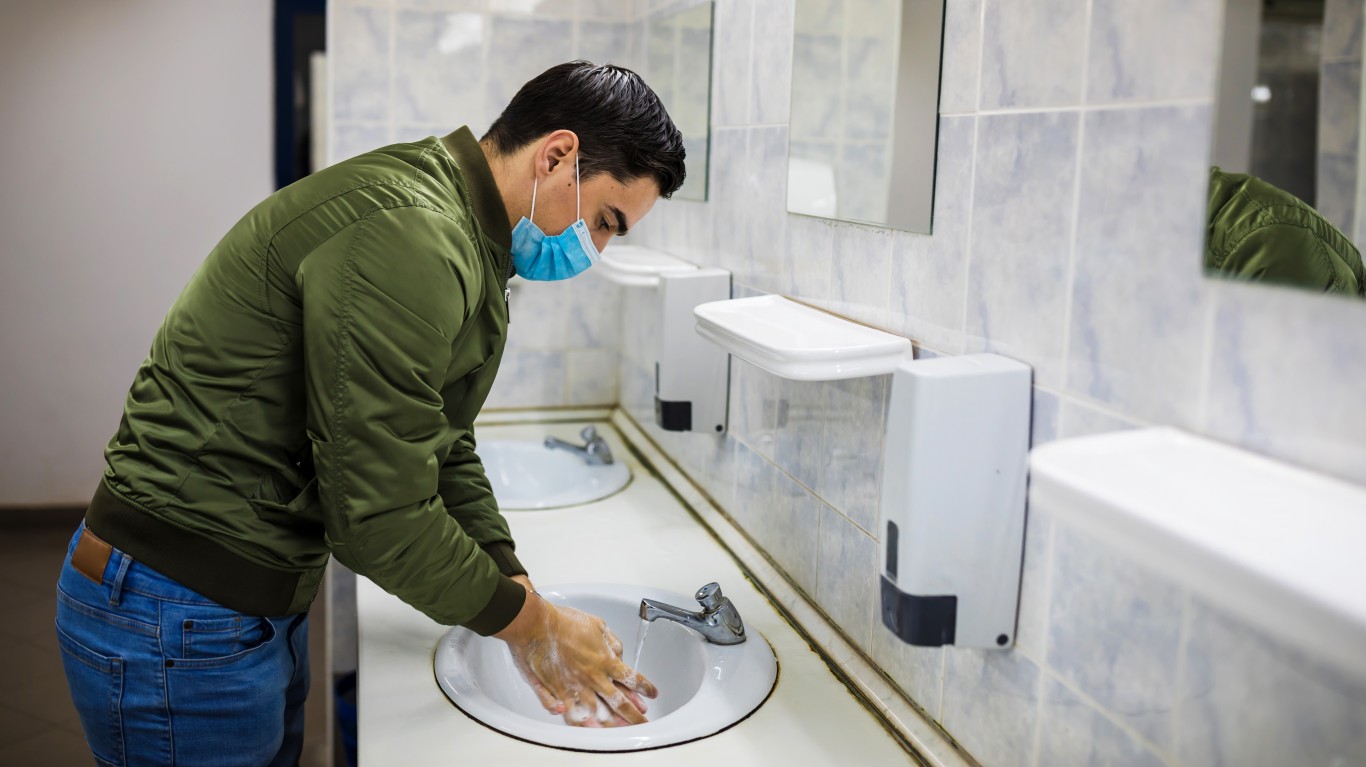

The U.S. reported over 718,000 new cases of coronavirus on August 3, bringing the total count to more than 34.8 million confirmed cases of COVID-19. There have been more than 608,000 COVID-19-related deaths — the highest death toll of any country.
New cases continue to rise at a faster rate. In the past week, there were an average of 22.8 daily new coronavirus cases per 100,000 Americans — an increase from the week prior, when there were an average of 17.1 daily new coronavirus cases per 100,000 people.
While new data shows that the risk of contracting COVID-19 is high in almost every part of the country, cities continue to be the sites of major outbreaks and superspreader events. Experts agree that the virus is more likely to spread in group settings where large numbers of people routinely have close contact with one another, such as colleges, nursing homes, bars, and restaurants. Metropolitan areas with a high degree of connectivity between different neighborhoods and a large population may be particularly at-risk.
The Auburn-Opelika, AL metro area consists of just Lee County. As of August 3, there were 10,688.0 confirmed cases of COVID-19 per 100,000 Auburn residents, roughly in line with the national rate. For comparison, the U.S. has so far reported 10,780.8 cases per 100,000 Americans nationwide.
In order to slow the spread of COVID-19, city and county governments have ordered the closure of thousands of consumer-facing businesses. These measures have led to widespread job loss and record unemployment. In the Auburn-Opelika metro area, unemployment peaked at 13.1% in April 2020. As of May 2021, the metro area’s unemployment rate was 2.8%.
To determine how the incidence of COVID-19 in the Auburn-Opelika, AL metro area compares to the rest of the country, 24/7 Wall St. compiled and reviewed data from state and local health departments. We ranked metro areas based on the number of confirmed COVID-19 cases per 100,000 residents.To estimate the incidence of COVID-19 at the metropolitan level, we aggregated data from the county level using boundary definitions from the U.S. Census Bureau. Population data used to adjust case and death totals came from the U.S. Census Bureau’s 2019 American Community Survey and are five-year estimates. Unemployment data is from the Bureau of Labor Statistics and is seasonally adjusted.
| FIPS | MSA | Population | Confirmed COVID-19 cases as of August 3 | Confirmed COVID-19 cases as of August 3 per 100,000 residents | Cumulative COVID-19 deaths as of August 3 | Cumulative COVID-19 deaths as of August 3 per 100,000 residents |
|---|---|---|---|---|---|---|
| 23460 | Gadsden, AL | 102,748 | 14,954 | 14,554.1 | 370 | 360.1 |
| 11500 | Anniston-Oxford, AL | 114,618 | 15,401 | 13,436.8 | 334 | 291.4 |
| 46220 | Tuscaloosa, AL | 250,681 | 32,972 | 13,153.0 | 642 | 256.1 |
| 13820 | Birmingham-Hoover, AL | 1,085,330 | 138,465 | 12,757.9 | 2,421 | 223.1 |
| 33860 | Montgomery, AL | 373,544 | 46,104 | 12,342.3 | 1,015 | 271.7 |
| 19460 | Decatur, AL | 152,271 | 18,433 | 12,105.4 | 392 | 257.4 |
| 19300 | Daphne-Fairhope-Foley, AL | 212,830 | 25,399 | 11,933.9 | 329 | 154.6 |
| 33660 | Mobile, AL | 430,655 | 50,784 | 11,792.3 | 903 | 209.7 |
| 22520 | Florence-Muscle Shoals, AL | 147,327 | 16,958 | 11,510.5 | 396 | 268.8 |
| 20020 | Dothan, AL | 148,252 | 17,055 | 11,504.1 | 421 | 284.0 |
| 12220 | Auburn-Opelika, AL | 161,152 | 17,224 | 10,688.0 | 181 | 112.3 |
| 26620 | Huntsville, AL | 457,003 | 48,242 | 10,556.2 | 691 | 151.2 |
Sponsored: Attention Savvy Investors: Speak to 3 Financial Experts – FREE
Ever wanted an extra set of eyes on an investment you’re considering? Now you can speak with up to 3 financial experts in your area for FREE. By simply
clicking here you can begin to match with financial professionals who can help guide you through the financial decisions you’re making. And the best part? The first conversation with them is free.
Click here to match with up to 3 financial pros who would be excited to help you make financial decisions.
Thank you for reading! Have some feedback for us?
Contact the 24/7 Wall St. editorial team.



